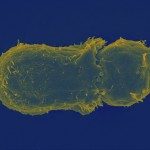Lien vers Pubmed [PMID] – 8663450
J. Biol. Chem. 1996 Jul;271(30):17896-902
In T cells, cell surface expression of CD45, a transmembrane tyrosine phosphatase, is required for T cell receptor (TCR) signal transduction. Indirect evidence suggests that CD45 function in TCR signaling involves the dephosphorylation of the C-terminal negative regulatory site of p56(lck), Tyr-505. To evaluate the importance of CD45-mediated dephosphorylation of p56(lck) Tyr-505 in TCR signaling, we established CD45(-) Jurkat cell lines expressing various forms of a chimera containing the extracellular and transmembrane domains of the epidermal growth factor receptor (EGFR) fused to p56(lck). We report that an activated EGFR/Lck chimera is able to reconstitute a Ca2+ response after CD3 stimulation in the absence of CD45 expression. In addition, the wild-type and kinase inactive versions of the EGFR/Lck chimera fail to restore early signaling. Restoration of the response by EGFR/LckF505 required EGF binding to the chimeric kinase. Altogether, these results provide the first direct evidence that the lack of efficient dephosphorylation of p56(lck) Tyr-505 is, in part, responsible for the unresponsiveness of CD45(-) cells. They also indicate that a second event is required for p56(lck) function in TCR signaling in addition to its dephosphorylation at Tyr-505.

